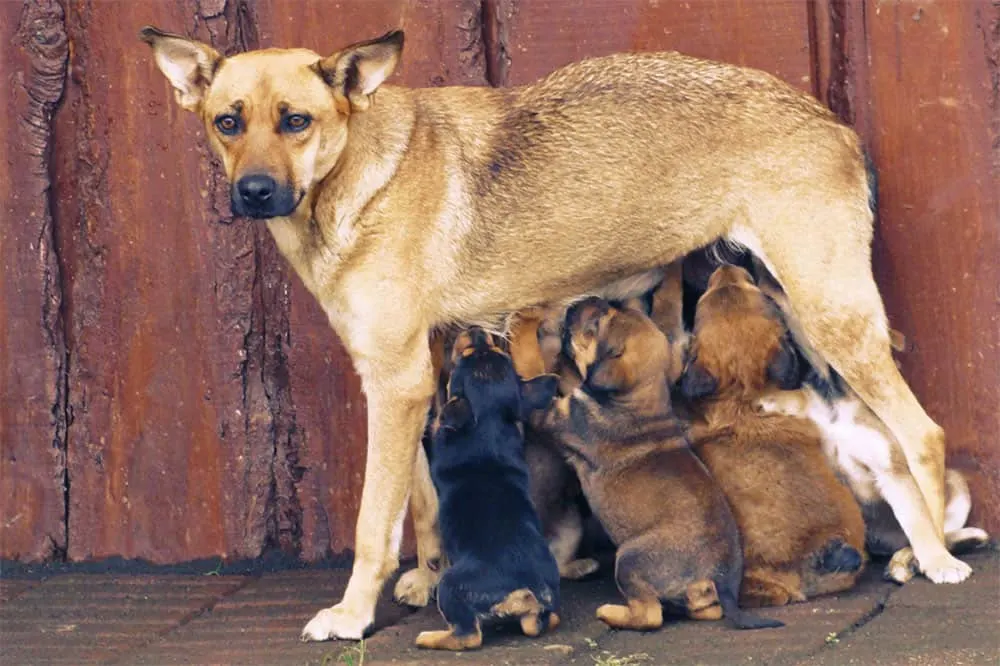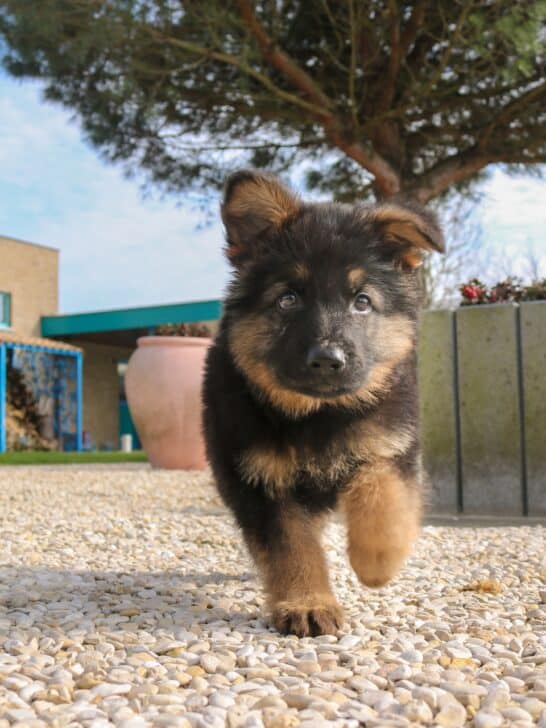Everything You Need To Know About Family Connections & Dogs. Does A Dog Remember It’s Mom?
Separation anxiety can be devastating for dogs and can take an exacting toll on both their physical and mental wellbeing.
When you leave your dog alone, even for the briefest amount of time, that anxiety can manifest as destructive behavior, like:
- Chewing anything that they can lay their paws on.
- Excessive howling and crying that can turn your previously friendly neighbors into your worst enemies.
- And the sort of emotional tantrums that would embarrass even the most spoiled toddler.
It’s a heartbreaking hurdle that a lot of dog owners have to overcome and is especially difficult to deal with, as it’s caused by your dog missing your companionship.
But with time and a little patience, it’s an issue that every owner, and their dog, are able to successfully address.
The thing is though, if your dog misses you enough to howl the halls of your house down, how much do they miss their mom?
Does they even miss their mom?
Come to think of it, does your dog even remember their mom?
Well, dogs aren’t reliant on visual stimuli for memory, and are more dependent on smell.
So, dogs remember their moms as adults because they recognize their scent.

Do Dogs Remember Their Moms? It’s A Memory Thing
Dogs have notoriously short memories, or so we’ve been led to believe.
They can skip from one hideously embarrassing situation to another without the slightest amount of shame or regret, and never seem to be phased by anything that happens around them.
However, if that really was true, and they weren’t able to retain even the simplest memories, how can they recognize you?
And how can they know what the words “walk, sit, dinner and cookie” mean, and know what the sound of a candy bar being unwrapped two hundred feet away meant?
And if dogs really did have the same sort of memory span as goldfish do, how would it ever be possible to train them?
Even though their immediate short-term memories aren’t brilliant, dogs learn how to deal and interact with the world around them through repetition and long-term memory.
The everyday actions and the things they need to know to successfully navigate their way through life are a combination of learned behavior and the aforementioned long-term memory.
Which as far as most psychological studies have been able to ascertain, seems to be pretty good in canines.
Surely then, if dogs do have good long-term memories, they’ll be able to remember their moms and know who they are?
So does that mean that somewhere in between knowing how to chase a ball, steal the best place on the couch and what their favorite treats are, they’ll have at least a vague memory of who their moms were and are as well?
Actually, it does.

The Parent Puppy Bond
The way that dogs remember things, people, and places are different from the way that we remember them, as they’re not reliant on visual stimuli for memory, and are more dependent on smell.
In fact, a study conducted by Professor Peter Hepper from Queens University in Belfast based on scent recognition and familial connection proved that adult dogs still remembered their mom.
It was a relatively straightforward test that was an extension of his earlier work that proved that young puppies separated from their mothers could recognize them based purely on smell.
For the test involving older dogs, Pepper used a control group of two-year-old, adult dogs as his subjects, and placed two towels in a room.
One towel was imbued with the scent of the adult dog’s mother and one that an unfamiliar female dog had been sleeping on for a couple of weeks.
He then let the adult dogs into the room, to test his hypothesis about said familial recognition in dogs that had been separated from their mothers as puppies.
Without fail, every single adult dog in the test group made a beeline for the blanket that their mother had used and ignored the blanket from the other dog.
It proved the idea that dogs do recognize, and remember their moms as adults and reinforced the idea that biological family was, and is as important to canines as the pack mentality and behavior.

There Are Some Variables
Nothing in life is completely clean-cut, and there were and are some variables that Hepper’s test had to account for.
The most notable being the dogs that weren’t separated from their moms when they were young and had spent their entire adult lives with at least one of their parents.
In this case, the test was mute as the dogs had already formed a strong and unbreakable bond that established that dogs were likely to develop a stronger bond with the members of their pack that they were biologically related to, than other dogs who became a part of it at some later stage.
But the bond between an adult dog and its mother, at least in this case, was always going to be strong as the dogs that had never been separated.
The idea that the age at which a dog was separated from its mother was also taken into account, with the theory being that the earlier the puppy was taken from its mother, the less likely it would be to remember her.
It had absolutely no bearing on the outcome of the test and proved that scent recognition was the sole factor that ensured that adult dogs remembered who their mothers were.
They remember their moms, because they recognize, and recognized their scent.
The Human Canine Connection
While it’s been proven that adult dogs do recognize their moms regardless of how long they’ve been separated from them, when you adopt your dog you assume the mantle and place of its parent.
The bond that your dog develops with you, is more intense than the biological one that exists between the dog and its parent.
And your dog, if you’re ever separated from him, regardless of how long you’re apart and for whatever reason will automatically recognize you the same way that he did his mother.
Because your scent is lodged in his long-term memory and dogs, unlike a lot of humans, instinctively know that family is about far more than biology.
FAQ:
1. What is separation anxiety in dogs?
Answer: Separation anxiety in dogs is a condition where the dog experiences extreme anxiety and stress when left alone. This can lead to destructive behavior, such as excessive chewing and howling, and can have a negative impact on the dog’s physical and mental well-being.
2. How can separation anxiety be addressed in dogs?
Answer: Separation anxiety in dogs can be addressed with time, patience, and training. Owners can gradually increase the amount of time their dog is left alone, provide enrichment activities and toys, and seek the help of a professional dog behaviorist if needed.
3. Do dogs remember their mothers?
Answer: Yes, dogs remember their mothers through scent recognition. A study conducted by Professor Peter Hepper from Queens University in Belfast based on scent recognition and familial connection proved that adult dogs still remembered their mom.
4. How do dogs remember things, people, and places?
Answer: Dogs do not rely on visual stimuli for memory, but instead are more dependent on scent. They can recognize people and places based solely on scent and can form long-term memories through repetition of learned behaviors.
5. Can dogs bond with their adopted owners in the same way as their biological parents?
Answer: Yes, dogs can bond with their adopted owners in the same way as their biological parents. The bond that a dog develops with their owner is more intense than the biological bond with their parent, and dogs recognize their owner’s scent in their long-term memory as family.






























